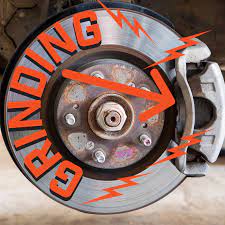When you press the brake pedal and your car slows down as expected, a lot of stuff happens. You might not think about it much, but it’s a complicated process that involves several parts working together to make sure everything goes off without a hitch.
One of those parts is the rotor. It’s basically a large metal disc that spins and is attached to the wheel of your vehicle. When you apply pressure on the brakes, they push against the rotor to slow it down, which then slows down your car.
If you’re hearing grinding when you brake, though, don’t just ignore it and hope for the best! It’s actually an indicator that something is wrong with your brakes or rotors—and if not taken care of immediately, could lead to bigger issues like damage to other parts.
The Most Common Cause of Grinding Brakes: The Pads Have Worn Too Low
Your brake pads are what bring you to a stop. If your car has disc brakes, the pads are the friction material that presses against the rotor, which is the round metal disc that spins along with the wheel. The back wheels have drum brakes instead of rotors. Drum brakes have shoes instead of pads, but their purpose is basically the same as for disc brakes: pressing against a spinning surface to create friction.
If your brake pads or shoes wear down too much, they won’t be able to stop your car as well as they should. On some cars, a sensor will tell you when it’s time to change them; on others, you’ll need to check yourself.
The easiest way to do this is by looking between your spokes—you may be able to see through them—or through any spaces in the wheels or hubcaps. The thickness of pad lining varies depending on how old your car is and how often you drive it, but if there’s less than half of one millimeter left on either side of both pads or shoes in every wheel, it’s probably time for new ones.
Grinding Brakes Can Be Due To a Broken Rotor
When you press on your brakes, the brake pads make contact with the rotors and create friction. This friction generates heat, which is why your rotors are designed to dissipate that heat so it won’t warp them. However, if your rotors aren’t able to do this effectively due to damage or wear, they can overheat and become warped themselves. Then you’ve got some warped rotors that need to be replaced.
Rotors Can Also Be Damaged by Unusual Wear Patterns
Though iron is a strong metal, it does have its limits. If rotors are damaged by unusual wear patterns, they’re probably not repairable.
What causes the rotors to wear unevenly? There could be something wrong with the braking system that needs to be addressed. A sticking caliper or leaking brake hose can cause uneven rotor wear. Also, if you don’t take care of warped rotors in a timely fashion and continue driving on them even though your brakes feel off, you will damage them further.
Some Drivers May Experience Brake Fade When Severe Heat Affects the Rotor and Pads
The first warning sign of brake fade is a grinding noise. Brake noise can be caused by the following:
- Frequent, hard braking
- Being on a bumpy surface
- The brakes’ loaded weight
- How much tire pressure is being used to stop the vehicle
Some Brakes Will Squeal or Whine as They Wear Out
The squealing or whining you hear is a warning that your pads are worn and should be replaced soon. A small metal tab, called an indicator, is embedded in the pad material and contacts the rotor when the pad has worn down enough. The tab acts as a safety feature to warn you of worn pads so you can replace them before they wear out completely. Otherwise, if the pads were to wear out completely, you would start hearing a loud metallic grinding noise as the metal backing of the brake pad rubs against the rotor.
Grinding brakes are a telltale sign that brake pads have worn down and need to be replaced.
Grinding brakes are a telltale sign that brake pads have worn down and need to be replaced. When all of the friction material wears off, the steel backing plates will rub against the rotor, causing an audible grinding sound.
Generally speaking, you won’t notice any problems until your brake pads become completely worn out. By then it’s too late—the rotors will have been damaged as well and need to be replaced. Because of this, it’s important to check and replace your brake pads regularly before they get to this stage.
Here are some examples of some common causes of grinding brakes:
- Brake Pads Worn Out: If the vehicle has gone above 30K miles without new brake pads, there is a good chance they are ready for replacement or near replacement. This can also happen if your brakes have been overused on steep descents or in stop-and-go traffic.
- Rotors Rusted and Unevenly Worn: If your rotors are rusted or unevenly worn, your brake pads may not make sufficient contact with them, resulting in grinding when braking. In this case you’ll need to resurface or replace your rotors as well as replace your brake pads at the same time so that everything is even again and working properly.

